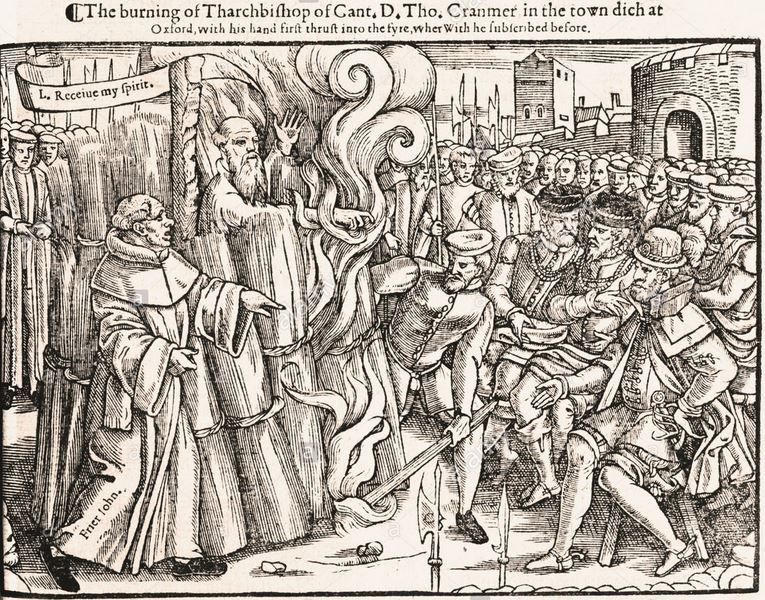Courage Restored: The Final Testimony of Thomas Cranmer (Part II)

Persecution Under Queen Mary
In 1553, when King Edward passed away, there was a great deal of controversy regarding who should next ascend to the English throne. Lady Jane Grey reigned for a mere nine days, being quickly deposed by Mary I, who had the support of parliament and many prominent English noblemen. Mary was a staunch Roman Catholic, and quickly set to work undoing the work of reformation carried out by Cranmer and other reformational clergy. She fiercely persecuted English Protestants, earning the nickname “Bloody Mary” because of her brutality.
Many of the English reformers fled to the continent, fearing for their lives. A small minority stayed behind, including Cranmer, as well as his dear friends, Latimer and Ridley. The three were soon arrested, and held in chains in the Tower of London. Latimer, Ridley, and Cranmer were all found guilty of heresy, and were moved to prison at Oxford.
On October 16, 1555, Latimer and Ridley were sent out to the stake to be executed first, while Cranmer was forced to watch from the prison tower. As Ridley was being tied to the stake, he publicly prayed, “Oh heavenly Father, I give unto thee most heartily thanks, that thou hast called me to be a professor of thee, even unto death. I beseech thee, Lord God, have mercy on this realm of England, and deliver it from all her enemies.”[1] He then turned to Latimer and said, “Be of good heart, brother, for God will either assuage the fury of the flame, or else strengthen us to abide it!”[2] As the flames began to scorch them, Latimer called back to his brother, “Be of good comfort, Master Ridley, and play the man! We shall this day light such a candle, by God’s grace, as I trust shall never be put out!”[3]
Latimer perished relatively quickly, but Ridley suffered a much longer, excruciating death. Cranmer watched in horror from the tower, knowing this would soon be his fate. In the days and weeks following, Cranmer was subjected to brutal interrogations, with the intent of breaking his resolve. Queen Mary wanted Cranmer as a trophy for her cause.
Sadly, under much pressure, Cranmer finally recanted. He signed letters denouncing his gospel convictions. He even partook in a Roman Catholic Mass! Mary was especially pleased by this. Here was the architect of the English Reformation, now a spokesman for her cause! But even still, Mary was determined that Cranmer should be executed. It would be a relatively painless death, a quick strangulation rather than a live burning; such was the only “mercy” that Mary would afford to Cranmer.
“This Unworthy Hand”
On March 21, 1556, Cranmer was slated to make one final public recantation. He was to preach a sermon denouncing his former protestant doctrines, warning the faithful not to follow his past errors. That morning, Cranmer ascended the pulpit of the University Church in Oxford. Many prominent bishops and churchmen were in attendance. All were excited to hear Cranmer’s defense of Roman Catholic doctrine. Yet once in the pulpit, Cranmer deviated from his prescribed script!
“And now I come to the great thing that troubleth my conscience more than any other thing that ever I said or did in my life: and that is, the setting abroad of writings contrary to the truth. Which here now I renounce and refuse, as things written with my hand contrary to the truth which I thought in my heart, and writ for fear of death, and to save my life, if it might be: and that is, all such bills, which I have written or signed with mine own hand, since my degradation; wherein I have written many things untrue. And forasmuch as my hand offended in writing contrary to my heart, therefore my hand shall first be punished. For if I may come to the fire, it shall be first burned. And as for the Pope, I refuse him, as Christ's enemy and antichrist, with all his false doctrine!”[4]
The whole assembly broke out into an uproar. Guards pulled Cranmer from the pulpit and led him to the site of his execution where he would now be burned alive. True to his word, as the flames were lit, before they reached any other part of his body, Cranmer held his hand into the fire. Never flinching, he repeated, “This unworthy right hand!”[5] As the flames rose, he called out, echoing the words of Stephen, “Lord Jesus, receive my spirit!”[6]
The Imperfect Martyr
Cranmer knew that he had sinned grievously by his earlier denials of the truth of the gospel. And though it pained him that he had so dishonored his Lord, it was that very same gospel which gave him hope as he faced the flames. For the ground of Cranmer’s assurance was not based in any false notion of his own perfections, but in the perfect righteousness of Jesus Christ.
This Jesus receives unworthy sinners, and though Christ’s children may at times stumble and fall, He never casts them out.
Christian, you may have sinned grievously against the Lord. You may have even dishonored His Name publicly. But you are not beyond hope! Like Cranmer, you too can confess your sins to the One who is faithful and just to forgive your sins, and to cleanse you from all unrighteousness (1 John 1:9.) Your fall may have been a dark chapter in the story, but it need not be the final chapter. Come home!
[1] Berkholder, Daniel. Careful Christianity. The King’s Hall Podcast. April 15, 2022.
[2] Ibid.
[3] Ibid.
[4] Farris, Michael. The History of Religious Liberty. New Leaf Publishing Group. 2015.
[5] Foxe, John. Foxe’s Book of Martyrs. 1854 Reprint. Digitized by Ohio State University, 2014.
[6] Ibid.